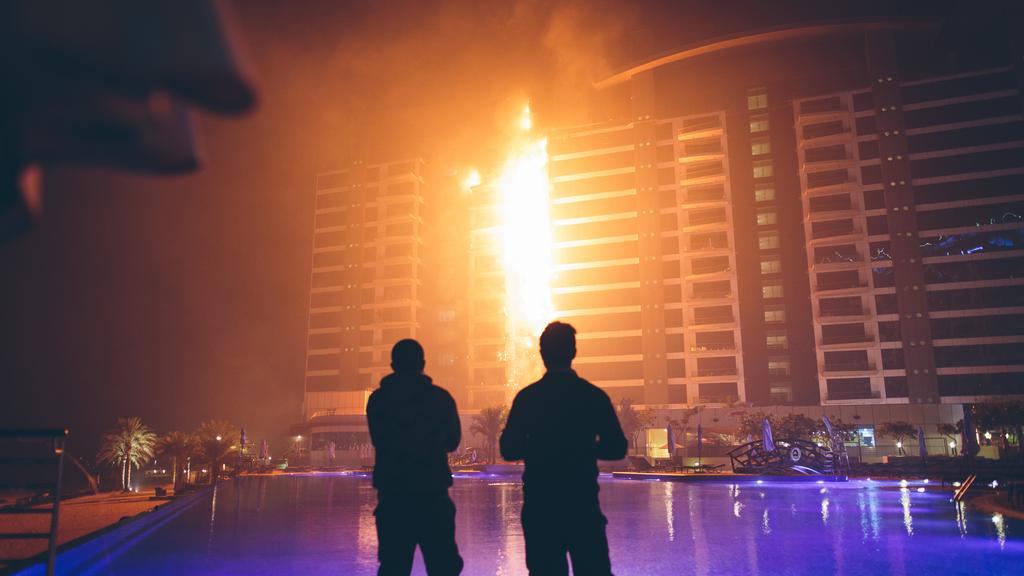22 Jan Building Fires And Insurance: What Every Landlord & Tenant Needs to Know
Home to some of the world’s largest residential sky-scrapers, Dubai has made news headlines for all the wrong reasons. Over the past few years, they have been plagued with building fires that have ripped through the homes and lives of residents, who may or may not of purchased home insurance, leaving the question of who is held responsible for such a catastrophe?
Since 2012 there has been a total of 7 sky scrapers which have gone up in flames for various reasons:
Zen Tower – in May 2018 a fire broke out in one of Dubai Marina’s high profile towers, which was started in a kitchen on the ground floor business level, spurred on by a unspecified flammable substance
Almas Tower – In April 2018, a pole on the top of the building started a minor fire in the Jumeirah Lake Towers.
Oceana Tower – in December 2016, one penthouse suite started the fire, thankfully only affecting one of seven buildings in the Palm Residence complex. The source of the fire is unknown.
Sulafa Tower – in July 2016, the Dubai Marina fire was caused by a discarded cigarette butt
Torch Tower – Ironically the name of the building sealed its fate. In both February 2015 and once more in August 2017, the Torch Tower in Marina has been hit with building fires, caused by recklessly tossed cigarette off of the balcony and catching fire to a neighboring apartment.
Address Hotel – On New Years’ Eve 2015, the iconic Dubai hotel caught fire before the fireworks display due to an electrical short circuit. The blaze lit up the side of the building, prompting a full-scale evacuation of the hotel.
Tamweel Tower – in November 2012 a fire broke out on the roof of the 34-storey building, with fallen debris and winds causing most of the balconies to also catch fire.
Thankfully the majority of these fires resulted in zero casualties, however the bigger question remains as to why these fires start in the first place and how to protect yourself as a landlord or tenant.
What Causes the Building Fires?
While the cause of each of these fires can vary from poor and improper cigarette butt disposal to electrical malfunctions, it is the reasons it spreads which has the communities concerned.
The rapid spread of these fires in every single instance mentioned was due to the use of flammable aluminum cladding on the exterior of the buildings. It’s estimated that roughly 70% of the buildings in Dubai which were constructed before the year 2009 are cladded with this non-fire resistant materials, leaving potential new fires a threat to residents.
In 2011, the Fire and Life Safety Code updated their requirements and it became mandatory that all buildings over 15 meters tall are required to be made of fire resistant aluminum cladding. Unfortunately this still leaves the hundreds of previously built towers unaccounted for, until the buildings are due for maintenance and then must comply with the new cladding regulations.
Who Bears the Insurance Responsibility?
Unfortunately, when individuals sign their tenancy contract the majority have a misconception that they are covered by the landlord’s insurance policy, leaving them at risk of being liable for damage or losses. In fact, the only areas that the property developer and the owner’s association are responsible for would be the common areas, leaving the tenant solely responsible for their property and belongings inside their rented unit. Therefore a tenant needs to take out their own individual insurance policy, and if they fail to do so, they will bear the costs for any incurred damages.
Who Regulates the Insurance?
The Federal Law No. 5 of 1985, known as the UAE Civil Transaction Law, regulates fire insurance coverage along with the duties and liabilities of the insurance provider. The law states that the insurer shall cover all damages caused by the fire notwithstanding the reason of the fire, provided that the damages are a direct result of the fire and have not been caused by deliberate or fraudulent actions of the insured or the beneficiary. Depending on the insurance provider and policy coverage, the scope of the insurance along with the compensation will vary.
Conclusion
Regardless of the newly enacted laws, many buildings within Dubai still remain cladded with the same flammable material, which means there is still a high risk that more buildings could experience this type of fire.
If tenants choose to not purchase insurance, they will be responsible for covering the costs for all damages in case of a fire. In addition, they will most likely face a situation where they will have to pay for a new apartment, while still having a financial obligation to continue to pay rent for the old apartment pending lease cancellation.
It is always advisable to seek legal advice prior to purchasing insurance for your property needs. If you have any questions or are needing legal advice for issues relating to Insurance in the UAE, Call Us at 04 336 8833 or email us at info@alkhoulilaw.com



